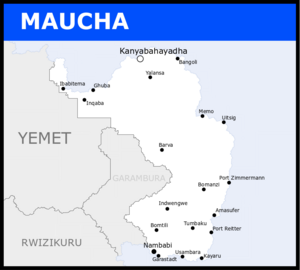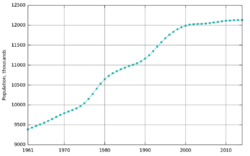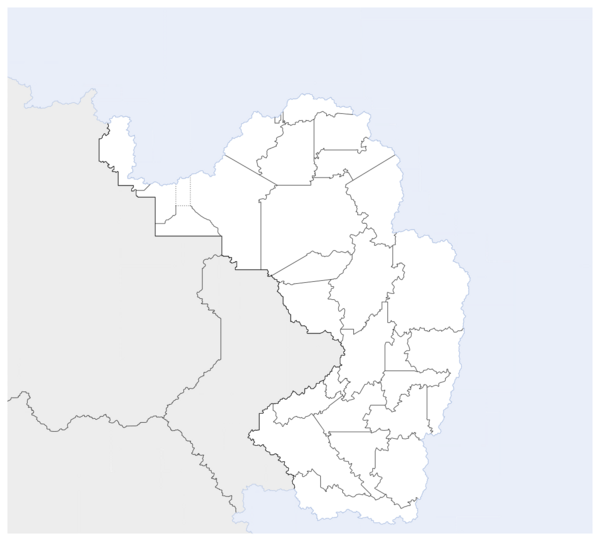Maucha
Democratic Republic of Maucha | |
|---|---|
Motto: "Für die Menschen aus dem Land des Silbers" (For the poeple from the land of silver) | |
 | |
| Capital | Kanyabahayadha |
| Largest | Nambabi |
| Official languages | Weranic |
| Recognised national languages | |
| Demonym(s) | Mauchian |
| Government | Federative presidential republic |
• President | Werner Okonkwo |
• Vice President | Mavo Holomisa |
• President of Senate | Kalere Odili |
• President of the Chamber | Issa Mbadinuju |
| Legislature | National Congress |
| Senate | |
| House of Deputies | |
| Formation | |
| Population | |
• 2020 estimate | 30,955,202 |
| GDP (PPP) | 2020 estimate |
• Total | $100,542,496,096 (46th) |
• Per capita | $3,248 (56th) |
| GDP (nominal) | 2020 estimate |
• Total | $70,144,487,732 (53th) |
• Per capita | $2,266 (51st) |
| Gini (2020) | 42.4 medium |
| HDI (2020) | 0.601 medium |
| Currency | Mauchian Fedha (MFD) |
| Calling code | +255 |
| Internet TLD | .mw |
Maucha, officially the Democratic Republic of Maucha, is a sovereign state whose territory is in northeastern Couis. Maucha is the easternmost country in the western hemisphere, occupying a total area of 419,033 km² on the eastern coast of the subcontinent of Bahia. It borders Yemet and Garambura to the west. Maucha has territorial disputes over the Ibabochia region with Yemet and the Kulo State. Maucha is the third most populated country in Bahia with a population of 30,955,202 (as of January 2020). The capital of the country is Kanyabahayadha, located at the delta of the Fedha river on the northern coast of the country. The metropolitan region of Nambabi is the largest urban area of the country and often claimed to be the legitimate Mauchian capital.
EARLY HISTORY
After the breakaway from the United Bahian Republic, Maucha fell into a civil crisis, as minorities started to revolt against the ethnic government. The main insurgence happened in the Onikhuma provinces, as they claimed that the Government favored the Watuaji and gave them no representation. In 1967, a civil war started after Watuaji President, Asani Ibori, dissolved the National Congress, trying to shut any and all uprisings against his government. Ibori’s authoritarian government and the Civil War would last until 1978, when the Onikhuma movement, supported by other minorities, overthrew Ibori’s seat. The new republic was established in 1978 and sought to open Maucha to foreign investment and private capital, but in 1980, a coup saw a communist militia group taking over the government and creating a one-party system. In 1993, the Maucha Revolution took place, as the people fought against the corrupt and authoritarian government. Later in the same year, the Democratic Republic of Maucha was established, now under a new multi-party system that focused on democracy. The first public election in the country took place in 1995, with Onikhuma President Dominic Iondela being the first democratically elected president in Maucha’s history. From then on, Maucha is considered one of the fastest growing countries in Bahia
GENERAL ECONOMIC/SOCIAL INFO
Etymology
History
Antiquity
Geography
Climate
Biodiversity
Demographics
| Rank | County | Pop. | |||||||
|---|---|---|---|---|---|---|---|---|---|
 Kartha  Mbresht |
1 | Kartha | Karthë | 2,514,214 |  Talax  Sorrë | ||||
| 2 | Mbresht | Mbresht | 1,805,664 | ||||||
| 3 | Talax | Talax | 1,156,782 | ||||||
| 4 | Sorrë | Hëna | 710,746 | ||||||
| 5 | Valqëndrush | Valqëndrush | 678,152 | ||||||
| 6 | Kufivalë | Kallëm | 517,013 | ||||||
| 7 | Korkès | Corchès | 489,357 | ||||||
| 8 | Sèngsagrát | Sèngsagrát | 477,781 | ||||||
| 9 | Halinos | Fillim | 432,776 | ||||||
| 10 | Lànxè | Dxèrdxè | 343,979 | ||||||
Ethnicities
Religion
Languages
Education
Government & Politics
Foreign relations
Military
Administrative Divisions
|






